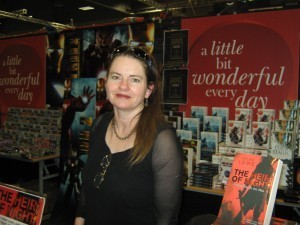Helen Lowe's Blog, page 320
October 24, 2010
"The Heir of Night" Guest Author Series: Marianne de Pierres
Recently, Marianne de Pierres invited me, together with fellow Orbit authors such as Kate Elliot and Gail Corriger, to guest post on her blog ahead of Worldcon in Melbourne. Today I am delighted to reciprocate the hospitality and host Marianne de Pierres as part of the FSF Guest Author Series, posting on the series' theme of "Why Fantasy-Science Fiction Rocks My World." Welcome, Marianne.
—
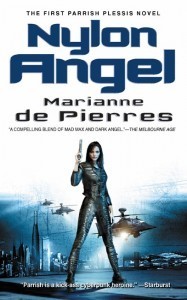 F-SF Guest Author Post: Marianne de Pierres
F-SF Guest Author Post: Marianne de PierresI recently had one of my best friends staying with me. I gave her my favourite book, Vermillion Sands by JG Ballard, to read.
Trouble is, she couldn't. 'I'm just one of those people who don't get it,' she said. 'I can't suspend my disbelief for fantasy and science fiction. It has to be real for me.'
It was then I realized that I not only 'get it' but I actually can't live without it. I can't live without elusive possibilities and brave new worlds. Those things are the colour in my life and the cushion against the mundane. As I recall, that need began with a book about fairies at the bottom of the garden when I was seven years old, and moved on to encompass worlds inhabited by sentient spiders, drug-addicted angels flying between alternate realities and multitudes of other fantastical stories and landscapes. Nowadays, I couldn't imagine my life without the echo of 'other'. It's as though I live in tandem universes and have the luxury of dipping into either when the need/want arises. Madness? Perhaps. But an altogether pleasant one.
Seal says it all:
http://www.youtube.com/watch?v=4Fc67yQsPqQ
I wonder what it must be like NOT to have such mystery in your life. As a nearly-fifty-year-old I still have an incredible desire to speculate about the future. What kinds of different will it be? What kinds of the-same? And honestly, what profession other than writing science fiction allows you to make up new names, new species, new worlds, new universes? It's like getting to be all powerful without the responsibility.
Although, there is still a responsibility, isn't there? Responsibility to project hope. At least that's what I believe. Fiction has long played the role of both provocateur and guide in our society and I feel privileged to have a part in that. In fact, I take my opportunities seriously. Even in the darkest moments of the lives of my characters, I imbue them with the strength to endure and the ability to think their way forward. What would be the point of me even writing their stories without hope? What would be the point in reading them? The fact that those characters might be in alien territories, of indeed be alien themselves, just adds a stimulating dimension to the exploration. Imagine fiction without time travel stories? Or first contact? Hardly worth reading, don't you think?
About Marianne de Pierres:
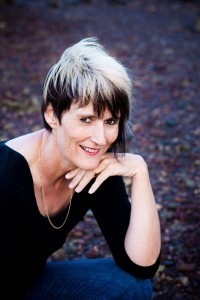 Marianne de Pierres is the author of the multi award-nominated Parrish Plessis and Sentients of Orion science fiction series. The Parrish Plessis series has been translated into eight languages and adapted into a Role Playing Game. She is also the Davitt award-winning author of the humorous Tara Sharp crime series, written under the pseudonym Marianne Delacourt. In 2011 she'll release the first of her new young adult dark fantasy duology entitled Burn Bright. Visit her websites at www.mariannedepierres.com, www.tarasharp.com and www.burnbright.com.au
Marianne de Pierres is the author of the multi award-nominated Parrish Plessis and Sentients of Orion science fiction series. The Parrish Plessis series has been translated into eight languages and adapted into a Role Playing Game. She is also the Davitt award-winning author of the humorous Tara Sharp crime series, written under the pseudonym Marianne Delacourt. In 2011 she'll release the first of her new young adult dark fantasy duology entitled Burn Bright. Visit her websites at www.mariannedepierres.com, www.tarasharp.com and www.burnbright.com.au
—
To see—and read—the other authors who have posted so far in the Guest Series, click here.
October 23, 2010
Arts on Sunday Interview on Podcast, Plus a New Review
The Arts on Sunday interview with Lynn Freeman is now on podcast, for those who missed it live or would like to listen again. Feedback so far has been positive and I thought it was very cool that they had someone do a reading by way of "intro."
—
A new review for The Heir of Night has also come through, this one from One Librarian's Book Reviews in the States. You can read it here.
This is a great site by the way—a reader called Andie, who read and loved Thornspell, emailed me through my website to point out the One Librarian review for that book. I have dropped by a few times since then and really enjoyed my visits. You can read the Thornspell review, too, if you like: it's here.
Arts on Sunday, The Supernatural Underground, And …
Just a reminder that I'll be appearing on Radio New Zealand's Arts on Sunday programme with Lynn Freeman this Sunday 24th at 2.40 pm approximately, if you have time to tune in. Remember to tune in ahead of time "just in case."
—
And this morning, fellow Supernatural Underground author Kimberley Derting is posting about Growing Up and reading that first truly "adult" book … in her case it was John Saul and Stephen King, in mine a toss up between Pride and Prejudice and Peyton Place—how about for you? I think Kimberley would be interested in hearing your response …
—
Also just to confirm—if you are thinking that James Norcliffe's guest blog post was going to run today as part of the FSF guest author series, you are right, but I have had to reschedule it until this Wednesday 27 when James will be available to reply to your comments. But I can assure you that he has written a grand post and I am thrilled to have it to end the series!
And then, of course, we'll find out whose name will go into The Wall of Night: Book Two, which—I am sure you have not forgotten!—is the last of The Heir of Night launch day competitions to close. (Basically, if you've posted a comment, your name will go in the draw, once for every day you've posted: read more here under "And Remember.")
A Few Armageddon Photos!
I had a blast at Armageddon today, including catching up briefly with Nalini Singh who was signing at 12.30 pm. It was great to meet some of you who have been visiting me here on the blog—and also to make new "book friends" who dropped by to hear about The Heir of Night. Thanks, too, to Karen and Margaret from Hachette who were present, and to Jeremy and the team from Whitcoulls for making me so welcome.
That'd be me!
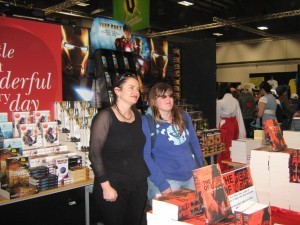
Photo with a fan
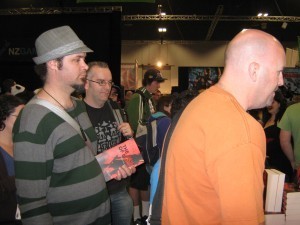
Signing queue
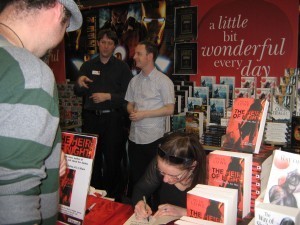
Signing inside the book ...
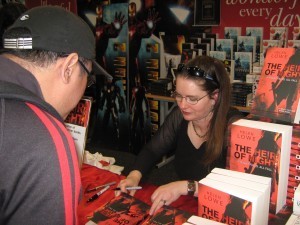
... and on the cover!
October 22, 2010
"The Heir of Night" Guest Author Series: Gillian Polack
I have only very recently met Gillian Polack, when I attended the 68th World Science Fiction Convention in Melbourne, Asutralia and we shared a panel—together with Karen Healey and fellow FSF Guest Series author, Mary Victoria—on the topic of "Writing Strange Lands: Other Cultures in YA Speculative Fiction." A very successful panel and a topic on which Gillian was clearly in her element—as is FSF, which is why I am delighted to welcome her here today, posting on: "Why Fantasy-SciFi Rocks My World."
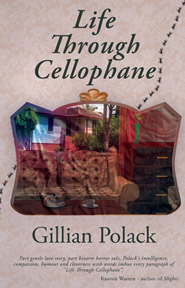 F-SF Guest Author Post: Gillian Polack
F-SF Guest Author Post: Gillian PolackI'm hopelessly in love with those tales that fall under the wide umbrella that is speculative fiction. Science fiction, fantasy, horror and those gloriously interstitial stories that slip somewhere between these genres: I love speculative fiction.
I love it that a thousand different writers can share its shelter and play with its tropes and share their dreams with readers. For me, it's all about sharing dreams. It's also about the act of dreaming. I dream my stories; I dream from the stories of others. Dreams make my private world glow.
If I had to describe those dreams, however, it wouldn't be through stories, it would be through questions. SF/F rocks my world, you see, because it's a vehicle for my questions as well as for my dreams. Dreams and questions walk hand in hand in my universe: they're each others' closest allies.
"What if?" is the question I see used over and over again to define the genre. I'm told that speculative fiction stories are tales that start with the question "What if?" That a speculative fiction story is that because the writer says "What if a hero were born?" "What if the world were made of jelly?" What if gravity were real?" We use our stories to explore questions and their consequences.
"Why not?" is the question that gives us permission to write and to explore. It helps us overcome our inhibitions and our limitations. "Why not" allows me to write the unexpected and put my fears and hopes on paper and into print.
"Who are we?" is what it's all about. Every permission and every daring assumption has this as its goal. Whether the story is about dancing robots or a reverie of clouds, whether it's speculating on string theory or on private agonies, "Who are we?" is the question that writers have to answer to bring it home to readers. The answers are not always serious, but they're always about us, somehow. This is the question that anchors our dreams.
Speculative fiction is amazing because, in answering "What if" and "Why not?" and "Who are we?" it shows us our dreams, it helps our dreams grow – it makes our universe more real to us and shows us other place and other times and makes them equally real.
It does in so many ways. Today I'm thinking of these ways of sizes of things. It does this through every size of thing. Little things – seeing rain, balancing a pebble deep in my hand, understanding how pain plays strange symphonies with the senses. Big things – dreaming of death and despair and the stories that will lead me way from them, seeing kingdoms and empires in my mind's eye and explaining them to readers using the little things. How a good writer plays with the little and the big is the real magic.
Fantasy and science fiction and horror rock my world because they're stories that speculate about human beings and about the responses of human beings to the universe. They're about growing and understanding and laughing and weeping and singing silly songs to oneself in the dead of night. Speculative fiction is about deepening realities and about twisting realities and about everything a writer can imagine.
Questions provoke the imagination. Little and big things are the alphabet of story. Together, they create the dreams that make me happy.
About Gillian Polack
 My second novel (Life through Cellophane, Eneit Press, 2009 was shortlisted for a Ditmar Award, and I and my courageous team of banqueteers were awarded a Ditmar for the 2009 Conflux banquet, set in Lake Charles, Louisiana in 1883. My life goes in circles, because my first novel (Illuminations, Trivium Publishing) was published in Lake Charles. My most recent book is an anthology where speculative fiction writers look at the cultural baggage we all carry (Baggage, Eneit Press, 2010) that was launched this September. While I'm working on the next Conflux banquet, my main focus right now is an SF novel, part of studies towards a doctorate at the University of Western Australia. You can find out more about Gillian Polack, here.
My second novel (Life through Cellophane, Eneit Press, 2009 was shortlisted for a Ditmar Award, and I and my courageous team of banqueteers were awarded a Ditmar for the 2009 Conflux banquet, set in Lake Charles, Louisiana in 1883. My life goes in circles, because my first novel (Illuminations, Trivium Publishing) was published in Lake Charles. My most recent book is an anthology where speculative fiction writers look at the cultural baggage we all carry (Baggage, Eneit Press, 2010) that was launched this September. While I'm working on the next Conflux banquet, my main focus right now is an SF novel, part of studies towards a doctorate at the University of Western Australia. You can find out more about Gillian Polack, here.
—
To see—and read—the other authors who have posted so far in the Guest Series, click here.
Weekend Events: Armageddon & Arts on Sunday!
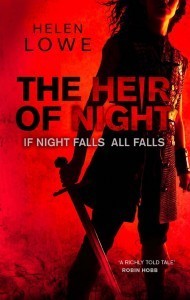
AU/NZ Cover
I'll be at Armageddon tomorrow, Saturday 23 at 11.30 am at the Whitcoulls Stand, Stall 45, (ASB Showgrounds, Auckland) for a signing and to answer your questions and chat about The Heir of Night and being an internationally published Fantasy-Science Fiction author—so do come along and say "hello": I'd love to see you there!
I'll also be appearing on Radio New Zealand's Arts on Sunday programme with the fabulous Lynn Freeman this Sunday 24th at 2.40 pm approximately, talking about the recent release of The Heir of Night in the USA, Australia and NZ—with the UK forthcoming in 2011— and what it all means for a NZ based author. Although the programme is scheduled for approximately 2.40 pm, it may pay to check in a little earlier "just in case"—and I believe the interview will be on podcast afterwards.
And don't forget to check in here tomorrow for the FSF Author Series guest post by Australian speculative fiction author—and Ditmar winner—Gillian Polack posting on (yes, you've got it!): "Why Fantasy-SciFi Rocks My World!" To read earlier posts in the series, go here.
October 21, 2010
Big Idea
My guest post on the "Big Idea" behind The Heir of Night and The Wall of Night series is now "live" on John Scalzi's "Whatever" blog. So if you are a regular "…on Anything, Really" reader you might like to check it out, here. (And do post a comment, I'd love to see you there!) If you are a visitor from Whatever, welcome—and please feel free to take a look around and let me know what you think. I've been having a lot of fun with the FSF Guest Author series lately—but you can see for yourself what's going on under the Categories. 
Keeping It Real: Character
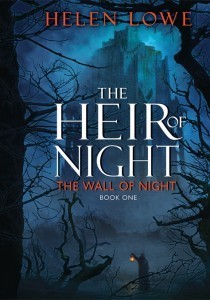
USA Cover

AU/NZ Cover
I have just written a guest editorial for AU/NZ publisher Orbit's Oz newsletter (my USA publisher is Eos/HarperCollins) on the release of The Heir of Night. Being a good Kiwi (NZ) gal, I am a little shy of bragging about the merits of my books "my ownself" (as Cap'n Mal Reynolds would put it, in Firefly.) I much prefer to fall back on what someone else has said, like the cover quote by Robin Hobb, but my Oz publicist, Nicola, said no, I had to tell people about the book "in my own words."
Now I do actually have an elevator pitch (I read the "newbie writer's handbook!") but in this case, what I said came more from what I've been thinking about lately as I've put together a whole heap of guest posts (you'll find the links to some of these on the News page of my website.) And here it is: "if you like your fantasy epic, and with more than a touch of mythic darkness (plus a dash of scifi thrown in); and with equal emphasis on character development as well as action, adventure and magic in the plot, then The Heir of Night could be just the book for you!"
As those of you who've been following " … on Anything, Really" know, in between co-ordinating the Fantasy-SciFi Guest Author Series, I am currently hard at work finishing The Wall of Night Book Two (working title: The Gathering of the Lost)—which is where the phrase "equal emphasis on character development" sprang from.
Firstly, it's true. As a Fantasy-SciFi writer, the world building and action of The Heir of Night story are really important to me, but the authenticity of the characters is also critical. I put a lot of work into this aspect of Heir, sometimes writing pages of backstory (that will almost certainly never make it into the actual series) just to get a better feel for what really made a particular character tick—and to make sure that their repsonse to situation/events "rang true." But of course, when you have a story that you know runs to four books—because you've plotted it out—you also have a vision of both the story arc and the "stations" along that arc that are coming up. But where there's track there is also scope for adventures to happen: switching tracks, being shunted into sidings, even derailment.
Fortunately, there's been no derailment yet for The Wall of Night series. But when authenticity is vital to your story, then the characters cannot just go and do something against their nature, as established in the story thus far, simply to advance the next element in the plot. Not if you're "keeping it real" as a writer.
This is what has come up for me in The Wall of Night: Book Two. I am very close to a major station on the story track right now, one I have intended reaching since I commenced writing the series. There's just one hitch—the character around which the plot action is centered just wouldn't behave in the way required to make the plot (as originally conceived) work. In fact, such behavior would be totally "out-of-character" in terms of how this individual has evolved.
So in order to remain true to the character, the plot has to change. A stopper? Again fortunately, not in this case. The change required is more of an adjustment: the same station is still right ahead on the story track , but the roofline has changed—there's more cupolas now, and fewer spires (just to extend the metaphor!)
Do I have to remain true to the character? I think so, otherwise I would stop being convinced by the story—and so, I suspect, would you. The great thing though, is that stories, although they can be like railway lines, also have a habit of transforming into rivers in the twinkling of an eye. And although rivers may flow within banks, their currents are constantly shifting and reforming within those broad confines: the sandbank that appears one day may have disappeared by the next; if the water finds a blockage in one place, then it flows around or through it. So, too, with story—a character develops in a certain way and the current of the story shifts to accommodate the change.
A ride? Sometimes. But the real deal, for me, lies in allowing the interaction between character and plot to happen and being willing to ride any rapids that follow. And rapids can be wild—but they're also exhilarating.
October 20, 2010
"Is Fantasy Really Escapism?"
Alan Baxter responds to Anne Hamilton's guest post yesterday with this great article, here—so do check it out. It's great to see that The Heir of Night FSF Guest Author Series is sparking new posts! 
And of course today's guest author is Julie Czerneda—just scroll down to read her post or click here.
"The Heir of Night" Guest Author Series: Julie Czerneda
Although the focus of this FSF Guest Author Series has been on AU/NZ authors, to celebrate the release of The Heir of Night into Australia and New Zealand on October 7 (it was released in the USA on September 28), today's guest, Julie Czerneda, is in fact Canadian. But she is a Canadian with links to the AU/NZ speculative fiction community and was the International Literary Guest Of Honor at ConScription, the NZ Science Fiction-Fantasy Convention in 2009—which is where I met her for the first time. NZ and Canada are just a wee way apart—about 10,000 miles or 14,000 kilometres, I think—but we have stayed in touch nonetheless and I am delighted to welcome Julie to the guest series today, posting on—yup, you've guessed it—"Why Fantasy-SciFi Rocks My World."
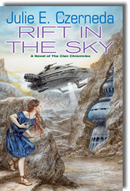 F-SF Guest Author Post: Julie Czerneda
F-SF Guest Author Post: Julie CzernedaI remember the moment.
We'd moved. I'd gone from being an airforce brat, living where I could hear foghorns on the ocean, to being the only new kid in an Ontario suburb. The school systems weren't the same, so I was in grade 5 instead of 4. We'd moved, and I didn't fit, not yet. I remember being happy and making friends, but I remember reading whenever I could. By moonlight, if necessary.
Within a few months, though, I ran out of books. (My parents had a wonderful assortment. Mysteries, thrillers, a great deal of it wartime and British. Read them all.)
I dared venture into the school library, which was very old and small and oddly empty most of the time.
I was overwhelmed with choice. I had to start somewhere, so I picked the N shelf, the easiest one to reach. And I read. Every title, in order.
I wasn't thrilled by the first few I read, but I was persistent. I remember pulling out a slim brownish grey volume (nothing had a dustjacket, everything was brownish grey). I started reading and couldn't stop.
That was the moment.
The slim volume was "Star Rangers" by Andre Norton. (Later rereleased as "The Last Planet.") It was my very first encounter with science fiction and I was instantly in love.
I read every Norton I could find. I made my Dad take me to the public library and found more Nortons and Nourse, (also an N). Best of all, there was an entire wall of science fiction! (Which I had to convince the librarians to let me read, since it was in the adult section and I wasn't very tall.) I read every one, in alphabetical order so not to miss anyone, discovering Asimov, Bradbury, and Clarke, and more.
Whenever I ran out of something new to read, of course, I'd borrow and reread "Star Rangers."
My Dad began bringing home a few books for me every payday. C.S. Lewis. The pulps of his teens: Doc Savage. John Carter of Mars.
Then, Tarzan of the Apes. (That was when I went from reading to writing. When I didn't like what happened to Tarzan in the end, my mother gave me a typewriter instead of the sequel. I wrote my own ending, and haven't stopped since.)
Why did science fiction matter so very much to me? No one else I knew, except my Dad when he'd been young, read it. I was the only person who signed out most of the science fiction in the local library, or from my school, in those years. I already loved fantasy (still do), but science fiction … it was different.
I can tell you why.
I knew then.
I know now.
Science fiction stories are about more than here and now. They take us over the hills of our understandings and refuse to let us limit ourselves. They blow open walls and lift roofs and tickle those little hairs at the back of the neck. Most of all, science fiction grants power, the power to wonder about anything. To read, to think in science fiction terms, is to take responsibility to use that power — to wonder about everything.
Oh, I remember the moment.
That's when science fiction set my imagination free, forever.
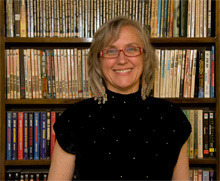 About Julie Czerneda:
About Julie Czerneda:Since 1997, Julie E. Czerneda has turned her love and knowledge of biology into science fiction novels and short stories that have received international acclaim, multiple awards, and best-selling status. A popular speaker on scientific literacy and SF, in 2009 Julie was Guest of Honour for the national conventions of New Zealand and Australia, as well as Master of Ceremonies for Anticipation, the Montreal Worldcon. She's presently finishing her first fantasy novel, A Turn of Light, to be published by DAW in 2011. Most recently, Julie was a guest lecturer at the National Science Teachers' convention in Philadelphia and participated in Laurentian's Social Science & SF conference. As for new projects, Julie is co-editing Tesseracts 15: A Case of Quite Curious Tales with Susan MacGregor and will be a juror for the 2011 Sunburst Awards. (No matter what, she'll be out canoeing too.) For more about Julie's work, visit www.czerneda.com
—
To see—and read—the other authors who have posted so far in the Guest Series, click here.

